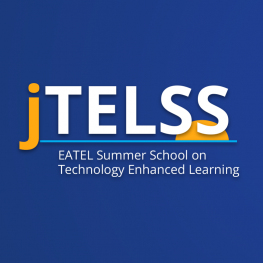Speakers
Sebastian Serth
Hasso Plattner Institute, University of Potsdam, GermanyChristiane Hagedorn
Hasso Plattner Institute, University in Potsdam, GermanyStart
05/06/2023 - 14:00
End
05/06/2023 - 15:30
How to Foster Collaboration in Online Courses with Pair Programming
Monday 05/06 14:00-15:30h
Workshop Space B
Abstract
In many contexts, working and learning with peers is beneficial and provides more fun to the learners. Peers can directly support each other, empowering them to master complex problems. In computer science education, pair programming as a form of group work has shown many positive effects. Although computer science teachers often ask students to work in pairs, they rarely introduce pair programming concepts or require active reflection, making this method less powerful. Relying on group work can also lead to challenges for online and in-person classes regarding differentiated grades, ensuring all learners acquire knowledge equally, matching suitable peers, or methodologically supporting learners. In this workshop, we will share our insights about collaborative environments in online learning, specifically in programming MOOCs. You will focus on different aspects of pair programming challenges, sketch potential solutions in small groups and present your results. Afterward, we discuss the approaches, advantages, and disadvantages. After the workshop, you will better understand why collaborative work in your teaching activities helps learners and take home a guideline on what to consider when setting up a programming peer activity.
Needs Analysis
We will discuss various strategies TEL researchers could use to foster collaborative work in online courses (synchronous and asynchronous) and highlight some strategies for learner matching we have experimented with. Throughout the workshop, we aim to encourage PhD candidates to consider how a suitable research setup might look like and which hypotheses might be tested with it. The workshop results and the participants’ feedback will be used to create a collaborative environment for synchronous activities in upcoming online courses introducing programming concepts. Specifically, the workshop will help us to identify how we could match learners in these courses for given tasks and thereby reduce the need to ask for external help while working on an assignment.
Learning Objectives
This workshop has the following learning objectives: (1) Participants will learn more about different learning activities in programming courses, especially in online contexts. (2) They will increase their understanding of pair programming activities and the learners’ needs in beginner courses. (3) Additionally, we will reflect on the advantages and limitations of collaborative work in online courses and (4) discuss how a corresponding research experiment could look like. (5) Finally, we aim to show participants how to transfer the newly acquired learnings to their own research.
Pre-activities
We do not require participants to perform mandatory pre-activities. However, we can share different resources as a preparation for our workshop, allowing participants to gain the most out of our session. For example, we already gained experience with a web-based programming environment, various examples of programming courses targeting beginners and can share details about the team activities we have done before. Participation in our workshop does not require prior experience with any programming language, even though it is beneficial. We will provide a short introduction to the concept of pair programming at the beginning of the workshop and thereby ensure all participants share a common understanding.
Session Description
During our session, we will have four main activities: Starting with a (1) short introduction using a presentation, we will then switch to (2) an activity in small groups and close our session with (3) a round of presentations and (4) a discussion. During the group activity, we will guide participants to discuss questions on (A) how to specifically design a pair programming activity in MOOCs and think of counter measurements for potential issues that could arise from transforming activities to an online scenario. Further, we encourage participants to discuss (B) how to match learners and which criteria to use or (C) how to design an experiment to validate the underlying hypotheses. For the presentations, workshop participants will need to summarize their work on a flip chart and structurally present it to others.


